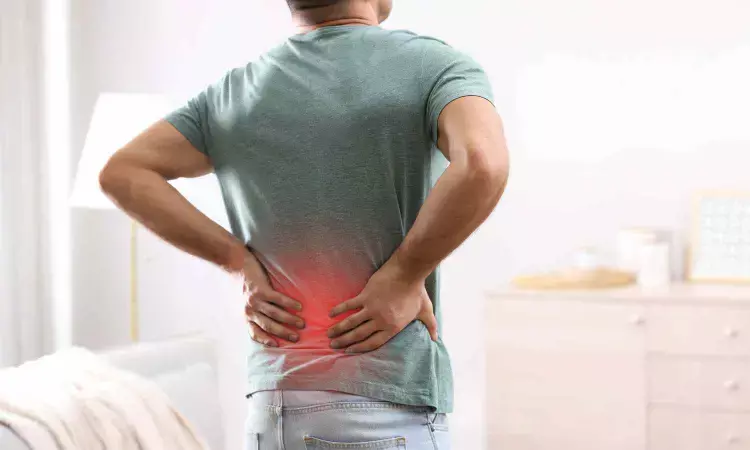- Home
- Medical news & Guidelines
- Anesthesiology
- Cardiology and CTVS
- Critical Care
- Dentistry
- Dermatology
- Diabetes and Endocrinology
- ENT
- Gastroenterology
- Medicine
- Nephrology
- Neurology
- Obstretics-Gynaecology
- Oncology
- Ophthalmology
- Orthopaedics
- Pediatrics-Neonatology
- Psychiatry
- Pulmonology
- Radiology
- Surgery
- Urology
- Laboratory Medicine
- Diet
- Nursing
- Paramedical
- Physiotherapy
- Health news
- Fact Check
- Bone Health Fact Check
- Brain Health Fact Check
- Cancer Related Fact Check
- Child Care Fact Check
- Dental and oral health fact check
- Diabetes and metabolic health fact check
- Diet and Nutrition Fact Check
- Eye and ENT Care Fact Check
- Fitness fact check
- Gut health fact check
- Heart health fact check
- Kidney health fact check
- Medical education fact check
- Men's health fact check
- Respiratory fact check
- Skin and hair care fact check
- Vaccine and Immunization fact check
- Women's health fact check
- AYUSH
- State News
- Andaman and Nicobar Islands
- Andhra Pradesh
- Arunachal Pradesh
- Assam
- Bihar
- Chandigarh
- Chattisgarh
- Dadra and Nagar Haveli
- Daman and Diu
- Delhi
- Goa
- Gujarat
- Haryana
- Himachal Pradesh
- Jammu & Kashmir
- Jharkhand
- Karnataka
- Kerala
- Ladakh
- Lakshadweep
- Madhya Pradesh
- Maharashtra
- Manipur
- Meghalaya
- Mizoram
- Nagaland
- Odisha
- Puducherry
- Punjab
- Rajasthan
- Sikkim
- Tamil Nadu
- Telangana
- Tripura
- Uttar Pradesh
- Uttrakhand
- West Bengal
- Medical Education
- Industry
Only around 1 in 10 common non-surgical and non-invasive treatments effective for back pain: BMJ

Only around 1 in 10 common non-surgical and non-invasive treatments for lower back pain is effective, suggests a pooled data analysis of the available research, published online in BMJ Evidence Based Medicine.
And the pain relief they offer is only marginally better than that achieved with a placebo, the findings indicate.
Low back pain is common and debilitating, and 80%-90% of it is categorised as non-specific, because there’s no immediately identifiable cause, note the researchers.
Non-surgical and non-invasive approaches are recommended as the initial treatment approach. But many such options are available, and it’s not always easy to know which ones are effective, point out the researchers.
To build on the evidence base, the researchers scoured research databases for published randomised placebo-controlled trials of non-surgical and non-interventional treatments for people with non-specific low back pain, with the aim of pooling the results.
The approaches included were pharmacological, such as non-steroidal anti-inflammatory drugs (NSAIDs) and muscle relaxants, and non-pharmacological, such as exercise, massage, and spinal manipulation.
A total of 301 trials investigating 56 different treatments or treatment combinations were included in the pooled data analysis. The trials were carried out in a total of 44 countries in Africa, North America, South America, Asia, Australia, and Europe.
The most common interventions were NSAIDs (27 trials), opioids (26 trials), laser and light therapy (25), acupuncture (24), and gentle manual therapy (mobilisation; 19 trials).
Fifty two trials sampled participants with acute low back pain; 228 trials with chronic low back pain; and 21 trials participants with both types. Pain intensity was most often assessed using the Visual Analogue Scale or the Numeric Rating Scale.
Of the 69 treatment comparisons included in the trials, the certainty of the evidence was moderate for 11 (16%), low for 25 (36%), and very low for 33 (48%), as assessed by the GRADE system.
The pooled data analysis showed that compared with placebo, no non-pharmacological treatments and only NSAIDs emerged as effective for acute low back pain; exercise, spinal manipulation, and taping, antidepressants and drugs that target pain receptors (TRPV1 agonists) emerged as effective for chronic low back pain.
But the effects were small.
Moderate quality evidence showed that treatments for acute low back pain that weren’t effective included exercise, steroid injections and paracetamol, while anaesthetics (i.e. Lidocaine) and antibiotics weren’t effective for chronic low back pain, the analysis showed.
The evidence was inconclusive for 10 non-pharmacological and 10 pharmacological treatments for acute low back pain. It was also inconclusive for a wide range of 22 non-pharmacological treatments, including acupuncture, massage, osteopathy and TENS, and 16 pharmacological treatments, including antidepressants + paracetamol, complementary medicines, bisphosphonates, and muscle relaxants for chronic back pain.
The researchers point out that many of the available trials included only a few participants and reported inconsistent results, added to which, the type and quality of some of the placebos used varied considerably, potentially affecting the certainty of the findings.
But they say: “Our review did not find reliable evidence of large effects for any of the included treatments, which is consistent with clinical guidelines and our previous review. While we would like to provide more certain recommendations for where to invest and disinvest in treatments, it is not possible at this time.”
They emphasise: “There is a clear need for large, high-quality, placebo-controlled trials to reduce uncertainty in efficacy estimates for many non-surgical and non-interventional treatments.”
Reference:
Cashin AG, Furlong BM, Kamper SJ, et alAnalgesic effects of non-surgical and non-interventional treatments for low back pain: a systematic review and meta-analysis of placebo-controlled randomised trialsBMJ Evidence-Based Medicine Published Online First: 18 March 2025. doi: 10.1136/bmjebm-2024-112974
Dr Kamal Kant Kohli-MBBS, DTCD- a chest specialist with more than 30 years of practice and a flair for writing clinical articles, Dr Kamal Kant Kohli joined Medical Dialogues as a Chief Editor of Medical News. Besides writing articles, as an editor, he proofreads and verifies all the medical content published on Medical Dialogues including those coming from journals, studies,medical conferences,guidelines etc. Email: drkohli@medicaldialogues.in. Contact no. 011-43720751


